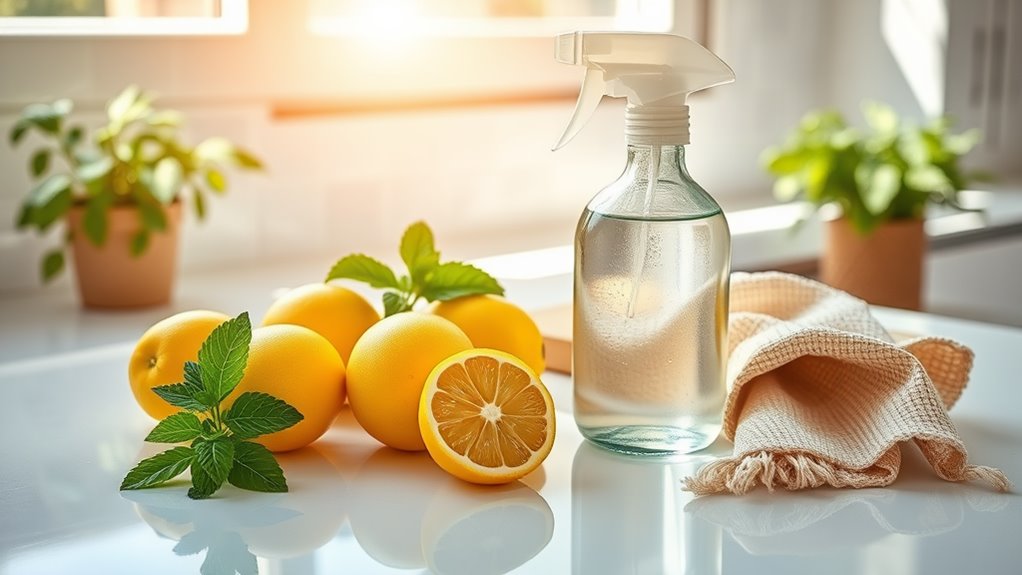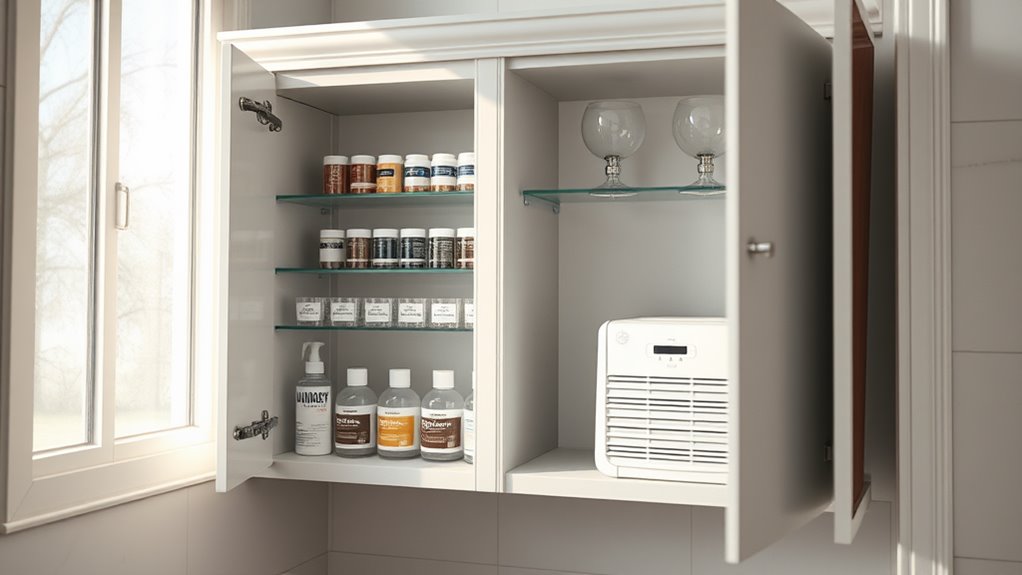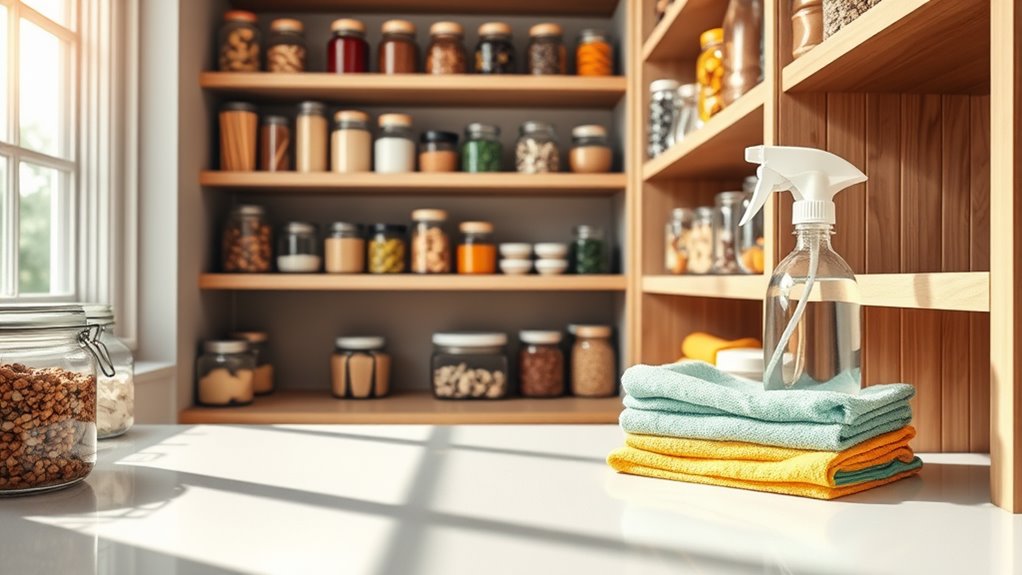I Don’t Use Alcohol-Based Disinfectants Anymore-Here’s What I Use Instead
If you’re moving away from alcohol-based disinfectants, consider using natural alternatives instead. Ingredients like vinegar, baking soda, and essential oils such as tea tree and eucalyptus provide effective disinfecting power without the harsh chemicals. You can even make your own cleaning solutions at home for a more eco-friendly approach. Plus, these options are safer for your skin and the environment. Stick around to discover more about DIY solutions and their benefits!
Key Takeaways
- I switched to natural disinfectants like vinegar and baking soda, which effectively clean without harsh chemicals.
- Essential oils such as tea tree and eucalyptus provide antimicrobial properties for a fresh and safe environment.
- Homemade cleaning solutions, like a vinegar and water all-purpose cleaner, are cost-effective and environmentally friendly.
- Alcohol-free products reduce health risks and flammability, making them safer for home use.
- Using biodegradable ingredients supports sustainability and minimizes environmental impact.
The Dangers of Alcohol-Based Disinfectants
While many people rely on alcohol-based disinfectants for their convenience and effectiveness, they come with notable dangers that shouldn’t be overlooked.
These products can irritate your skin and respiratory system, leading to discomfort or allergic reactions. Additionally, their flammability poses a risk, especially in environments where sparks or heat sources are present. Furthermore, using allergy-safe products can significantly reduce the likelihood of these adverse effects on your health. Moreover, utilizing natural ingredients for cleaning can be just as effective without the harmful side effects. For instance, eco-friendly deep cleaning methods promote a healthier living space by harnessing the power of natural solutions, including plant-based cleaners that are effective against germs.
You might also find that frequent use can compromise the integrity of surfaces, causing damage over time.
Opting for an alcohol-free cleaner not only mitigates these risks but also offers a safer alternative for your home or workplace. These cleaners are often derived from natural ingredients, making them gentler on your skin and the environment, ensuring you maintain a clean space without the hidden dangers of alcohol-based options. Incorporating pet-safe natural cleaning solutions can further enhance the safety of your cleaning routine.
Natural Disinfectants: An Overview
Natural disinfectants offer a safe and effective way to keep your spaces clean without the harsh chemicals found in traditional cleaners.
These alternatives harness the power of plant-based ingredients, ensuring a gentle yet potent approach to sanitation. For instance, vinegar’s acetic acid effectively breaks down grime and bacteria, while baking soda acts as a natural abrasive, tackling tough stains. Additionally, using eco-friendly cleaners can help maintain the shine on kitchen appliances. Creating a safe all-natural disinfectant spray at home can further enhance your cleaning routine. Moreover, many of these natural ingredients are biodegradable substances, making them an environmentally friendly choice. In fact, using DIY vinegar cleaner can provide an effective solution for those tough cleaning challenges.
Citrus juices, rich in citric acid, provide both a fresh scent and disinfecting properties. When you’re looking to sanitize, consider using these ingredients in combination, creating a versatile cleaning solution tailored to your needs. Additionally, using hydrogen peroxide as a natural disinfectant can enhance your cleaning routine by effectively killing germs and viruses on surfaces.
Not only do natural disinfectants promote a healthier environment, but they also minimize exposure to synthetic chemicals, making them an excellent choice for conscientious cleaning.
Essential Oils With Disinfectant Properties
You might be surprised to learn that essential oils not only provide delightful scents but also possess powerful disinfectant properties. Oils like tea tree, eucalyptus, and lavender have been shown to effectively eliminate harmful bacteria and viruses. Additionally, many essential oils can enhance your cleaning routine by providing natural alternatives to harsh chemicals.
When you incorporate essential oils into your cleaning routine, consider their concentration and dilution. A few drops mixed with water or vinegar can enhance your cleaning arsenal. It’s vital to choose high-quality oils, as their potency varies greatly. With the right essential oils, you can achieve a clean, fresh environment without relying on harsh chemicals. DIY Countertop Cleaning Spray can be an effective way to utilize these natural ingredients. Moreover, creating a DIY Natural Anti-Mold Spray can help further reduce harmful mold growth in your home.
For instance, natural ingredients such as vinegar and baking soda can also boost the effectiveness of your homemade cleaners. Embrace the power of nature and elevate your cleaning game! Additionally, many essential oils have been proven to possess antimicrobial properties, making them excellent alternatives to traditional disinfectants.
Homemade Cleaning Solutions to Try
Creating your own homemade cleaning solutions not only saves money but also allows you to avoid harsh chemicals.
Start with a simple all-purpose cleaner by mixing equal parts of water and white vinegar in a spray bottle. This solution effectively cuts through grime and disinfects surfaces. For a fresh scent, add a few drops of your favorite essential oil.
If you need a glass cleaner, combine one cup of water, one cup of vinegar, and a tablespoon of cornstarch. This mixture leaves your windows streak-free.
For tougher stains, mix baking soda and water to form a paste, applying it directly to the problem area. These practical solutions empower you to clean effectively while maintaining control over the ingredients you use.
The Environmental Benefits of Going Alcohol-Free
While many people rely on alcohol-based disinfectants for cleanliness, going alcohol-free offers significant environmental advantages.
By choosing non-alcohol alternatives, you reduce the carbon footprint associated with production and transportation. These products often use biodegradable ingredients, minimizing harm to aquatic ecosystems when washed away.
Additionally, alcohol-based disinfectants can contribute to air pollution through volatile organic compounds (VOCs), but alcohol-free options typically have lower emissions.
Opting for eco-friendly solutions means you’re not only protecting your health but also supporting sustainable practices. You can also eliminate the risk of flammable substances in your home, enhancing safety.
Frequently Asked Questions
Are Alcohol-Free Disinfectants Effective Against COVID-19?
Yes, alcohol-free disinfectants can be effective against COVID-19 if they contain EPA-approved active ingredients. Always check the label for efficacy claims, and verify you’re following the manufacturer’s instructions for proper use and contact time.
How Do I Store Homemade Disinfectants Safely?
To store homemade disinfectants safely, keep them in dark, airtight containers away from heat and sunlight. Label each bottle clearly, and make certain they’re out of reach of children and pets for added safety.
Can I Mix Different Natural Disinfectants Together?
Mixing different natural disinfectants can enhance effectiveness, but be cautious. Always research each ingredient’s compatibility to avoid unwanted reactions. Test small batches first, ensuring safety and ideal performance before using your mixture on larger surfaces.
How Often Should I Disinfect Surfaces With Natural Solutions?
You should disinfect surfaces daily, especially high-touch areas like doorknobs and light switches. For less frequently used surfaces, aim for weekly disinfection. Consistency guarantees a clean environment, reducing the risk of germs spreading effectively.
Are There Any Allergies Associated With Essential Oils?
Yes, some people can develop allergies to essential oils, experiencing symptoms like skin irritation or respiratory issues. It’s vital to test oils on a small area first and consult a healthcare professional if you’re unsure.



